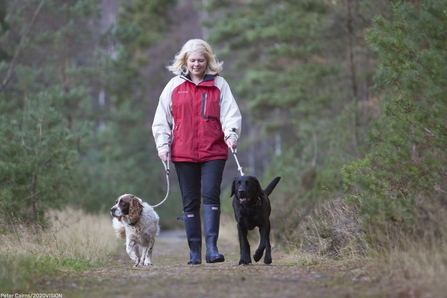Avon Wildlife Trust are urging dog owners to keep their pets on short leads, particularly when birds are nesting, species are emerging from hibernation and to protect grazing livestock.
Experts say dogs off leads are one of the biggest causes of wildlife disturbance – this is particularly problematic when many species are breeding and vulnerable either on or near the ground. A study by The Wildlife Trusts found that dogs off leads were responsible for 40% of wildlife disturbances in nature reserves, in comparison to just 5% by dogs on leads.
Dogs can also be a threat to sheep, cows and other grazing livestock, with regular problems reported on nature reserves cared for by Avon Wildlife Trust.
Dog waste is dangerous for wildlife too, as it can carry diseases, scare away animals and fertilise soils, affecting the natural balance of fragile habitats.
Dog owners can help wildlife if they:
- Keep dogs on short leads on nature reserves and the wider countryside
- Clean up after animals and dispose of dog waste in bins or at home
- Avoid using nature reserves if walking large groups of dogs
Bernie D’Arcy, Head of Nature Reserves at Avon Wildlife Trust, said:
“It’s great that so many people benefit from enjoying beautiful natural areas while out walking their dogs, but we urge responsibility.
“Wildlife is suffering huge declines and dogs in wild places can cause problems, especially from spring through to the end of summer when many species are breeding.
“To animals such as birds, mammals, insects, amphibians and reptiles, the mere smell of a dog can mark out an area as ‘unsafe’, disrupting their ability to feed, breed and survive.
“They can also pose a threat to the grazing livestock who are on some of our nature reserves and are vital to the way we manage these spaces for the benefit of wildlife.
“Dog poo is also a big issue, both with it being left on the ground and with people leaving bags tied to trees or bushes. It’s toxic for animals and can disrupt our beautiful wildflowers’ ability to flourish.
“If you do walk your dog on one of our nature reserves where this is permitted, please keep them on a short lead.
“Wildlife has so little space remaining in the UK, making it vital that we protect what we have and keep disturbance to a minimum on our reserve.”
Avon Wildlife Trust has seen multiple problems with dogs chasing grazing livestock, which has resulted in the deaths of animals.
Frankie Clinch, Nature Reserve Officer at Avon Wildlife Trust, shares what she’s experienced at the Walton Common nature reserve:
“With livestock grazing on Walton Common year-round, it is imperative that dogs are kept under very close control or on a lead.
“On numerous occasions when I have been on the reserve I have seen dogs allowed to run across the reserve wherever they please, seemingly under little to no control from the owner.
“The cattle on the Common are quite docile, however this could make them more vulnerable to attacks from dogs, as they generally aren’t as wary and therefore won’t necessarily move away if a dog comes running towards them.
“I also never visit the site without seeing at least one bag of dog poo left on the side of the path – usually multiple!
“Walton Common is an extremely valuable habitat for birds and small mammals, and dogs can cause a huge amount of disturbance to local wildlife if they run through areas of woodland and scrub, especially during breeding season."

